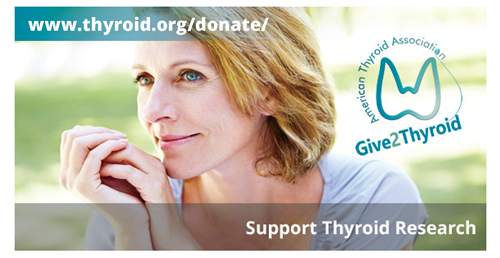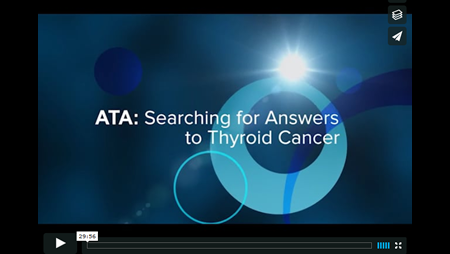Clinical Thyroidology for the Public summarizes selected research studies discussed in the previous month’s issue of Clinical Thyroidology, an official publication of the American Thyroid Association. Editor-in-chief, Alan Farwell, MD, FACE
Available in pdf format for saving and printing and Web page format for viewing online
PDF Format for Saving and Printing
Clinical Thyroidology for the Public Volume 13 Issue 3 (PDF file, 7.4 MB)
TABLE OF CONTENTS – Web Format
TABLE OF CONTENTS – Web Format
HYPERTHYROIDISM
Treatment for hyperthyroidism increases the risk of obesity in some patients
A common symptom of hyperthyroidism is weight loss without trying. Treatment of hyperthyroidism commonly results in weight gain, but the extent of weight gain is not well known. The aim of this study was to find out whether treatment of hyperthyroidism is associated with increased risk of developing obesity.
Torlinska B et al 2019 Patients treated for hyperthyroidism are at increased risk of becoming obese: findings from a large prospective secondary care cohort. Thyroid 29:1380–1389. PMID: 31375059.
(PDF File for saving and printing, 729 KB)
HYPOTHYROIDISM
Levothyroxine treatment of subclinical hypothyroidism does not improve symptoms in patients 80 years of age or older
Subclinical hypothyroidism much more common that overt hypothyroidism in adults, and its rate increases with age. Treatment of subclinical hypothyroidism is controversial as beneficial effects are hard to show in many studies. The current study was designed to examine the effect of treating subclinical hypothyroidism in patients who are 80 or older.
Mooijaart SP et al 2019 Association between levothyroxine treatment and thyroid-related symptoms among adults aged 80 years and older with subclinical hypothyroidism. JAMA. Epub Oct 30:1–11. PMID: 31664429.
(PDF File for saving and printing, 948 KB)
IODINE AND THE THYROID
Iodine supplementation lowers the long-term risk of thyrotoxicosis without increasing hypothyroidism
Iodine deficiency is a world-wide health problem affecting about 30% of the population. An unintentional consequence of iodine supplementation in iodine deficient populations has been a report of an increase of both hyperthyroidism and hypothyroidism. This study examined the rate of hyperthyroidism and hypothyroidism in a group living in an area in the north of Denmark a few years after the mandatory supplementation with iodine in the salt took effect.
Petersen M et al. 2019 Changes in subtypes of overt thyrotoxicosis and hypothyroidism following iodine fortification. Clin Endocrinol (Oxf ). Epub 2019 Aug 9. PMID: 31400012.
(PDF File for saving and printing, 770 KB)
THYROID CANCER
The Effect of Surgery Extent for Low-Risk Thyroid Cancer on Quality of Life
There are two surgery choices for people diagnosed with low risk papillary thyroid cancer: 1) hemithyroidectomy to remove just that part of the thyroid that contains the thyroid cancer or 2) total thyroidectomy. The purpose of the study reviewed here was to compare quality of life for people who underwent a hemithyroidectomy for low risk papillary thyroid cancer to quality of life for people who underwent total thyroidectomy.
Bongers PJ et al. 2020 Differences in long-term quality of life between hemithyroidectomy and total thyroidectomy in patients treated for low-risk differentiated thyroid carcinoma. Surgery 167:94–101
(PDF File for saving and printing, 871 KB)
THYROID AND PREGNANCY
Early pregnancy exposure to Bisphenol A may affect thyroid hormone levels
Chemicals in our environment that interfere with the endocrine glands and hormone levels are called endocrine disruptors. Two such endocrine disruptors that may affect thyroid function are bisphenols and triclosan. This study was done to evaluate potential association of bisphenol and triclosan levels in pregnant women and their thyroid hormone levels.
Derakhshan An et al 2019. Association of urinary bisphenols and triclosan with thyroid function during early pregnancy. Environ Int 133(Pt A):105123. PMID: 31521814.
(PDF File for saving and printing, 744 KB)
AUTOIMMUNE THYROID DISEASE
Children and adolescents with Hashimoto’s thyroiditis or Graves’ disease are at increased risk for autoimmune gastritis
Patients with autoimmune thyroid disease are at risk of having another autoimmune disorder. One such autoimmune disorder that occasionally occurs in patients with autoimmune thyroid disease is autoimmune gastritis, which can lead to iron and vitamin B12 deficiency. The current study screened children with autoimmune thyroid disease for the development of autoimmune gastritis.
Calcaterra V et al 2019 Anti-gastric parietal cell antibodies for autoimmune gastritis screening in juvenile autoimmune thyroid disease. J Endocrinol Invest. Epub 2019 Jul 1. PMID: 31264142.
(PDF File for saving and printing, 733 KB)










